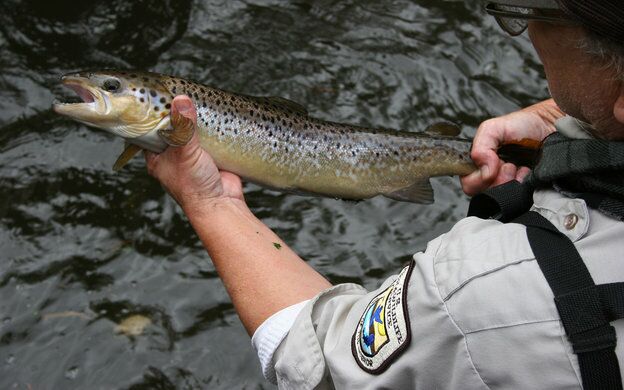Coalition challenges approval of genetically engineered salmon
 Courtesy / U.S. Fish and Wildlife Service Northeast Region
A member of the U.S. Fish and Wildlife Service Northeast Region removes an Atlantic salmon from the water for weighing and measuring.
Courtesy / U.S. Fish and Wildlife Service Northeast Region
A member of the U.S. Fish and Wildlife Service Northeast Region removes an Atlantic salmon from the water for weighing and measuring.
The Richmond-based advocacy and research organization, Friends of Merrymeeting Bay, has joined a coalition that includes environmental, commercial and recreational fishing organizations in filing a lawsuit over the recent decision by the U.S. Food and Drug Administration to approve the first-ever genetically engineered food animal, an Atlantic salmon crossed with other species.
The salmon — which was created by the Maynard, Mass.-based AquaBounty Technologies — is engineered to grow faster by using DNA from an Arctic Ocean eelpout and a Pacific King salmon. It’s also the first genetically engineered animal approved for consumption sale and consumption.
The lawsuit from the coalition challenges that approval saying that the FDA did so "without considering or fully disclosing the environmental and other risks of this unprecedented decision." The lawsuit also alledges the FDA determined it would not require labeling of the GE fish to let consumers know what they are buying, which led Congress to call for labeling in the recently passed omnibus spending bill, according to the release.
Of particular concern to the Friends of Merrymeeting Bay is the FDA’S decision to not consult wildlife agencies, as required by federal law, about the potential impact on the population of Pacific and Atlantic salmon — both of which are protected by the Endangered Species Act and are in danger of extinction.
If the genetically engineered salmon were to escape its planned growing facilities in the United States, or accidentally be released into the environment, they could threaten wild populations by mating with the endangered salmon species, outcompeting them for limited resources and habitat — or introduce new diseases according to a release by the Friends of Merrymeeting Bay.
The release by the organization claims that studies have shown there is a high risk of genetically engineered organisms escaping into the natural environment.
“Atlantic salmon populations including our endangered Gulf of Maine fish are hanging on by a thread — they can’t afford additional threats posed by GE salmon,” said Ed Friedman from Friends of Merrymeeting Bay. “The law requires agencies like FDA, who aren’t fisheries biologists, to get review and approval from scientists with that expertise. FDA’s refusal to do this before allowing commercialization of GE salmon is not only irresponsible, it violates the law.”
Read more
Study says Northeast fisheries threatened by climate change










Comments